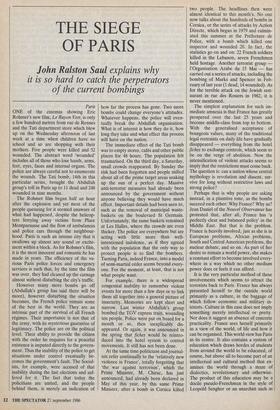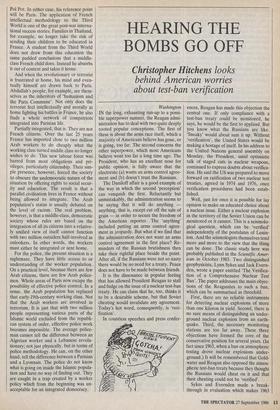THE SIEGE OF PARIS
John Ralston Saul explains why
it is so hard to catch the perpetrators of the current bombings
Paris ONE of the cinemas showing Eric Rohmer's new film, Le Rayon Vert, is only a few hundred metres from rue de Rennes and the Tati department store which blew up on the Wednesday afternoon of last week at a time when children have no school and so are shopping with their mothers. Five people were killed and 52 wounded. The abstract word 'wounded' includes all of those who lose hands, arms, feet, eyes, faces and internal organs. The police are always careful not to enumerate the wounds. The Tati bomb, 14th in this particular series, brought the Abdullah group's toll in Paris up to 11 dead and 248 wounded in nine months.
The Rohmer film began half an hour after the explosion and yet most of the people queueing for it seemed unaware of what had happened, despite the helicop- ters ferrying away victims from Place Montparnasse and the flow of ambulances and police cars through the neighbour- hood. Paris is such an intense city that it swallows up almost any sound or excite- ment within a block. As for Rohmer's film, it is the most innocent and romantic he has made in years. The efficiency of the va- rious Paris police forces and emergency services is such that, by the time the film was over, they had cleaned up the carnage almost without disturbing the city's traffic.
However many more bombs go off (Abdullah's group has said there will be more), however disturbing the situation becomes, the French police remain some of the best in the world. They are an intrinsic part of the survival of all French regimes. Their importance is not that of the army, with its mysterious guarantee of legitimacy. The police are on the political level. Their ability to provide the citizen with the order he requires for a peaceful existence is imputed directly to the govern- ment. Thus the inability of the police to get situations under control eventually be- comes the government's fault. The Social- ists, for example, were accused of that inability during the last elections and suf- fered for it. The fact that today the policitians are united, and the people behind them, is merely an indication of how far the process has gone. Two more bombs could change everyone's attitudes. Whatever happens, the police will even- tually break the Abdullah organisation. What is of interest is how they do it, how long they take and what effect this process will have on the nation.
The immediate effect of the Tati bomb was to empty stores, cafés and other public places for 48 hours. The population felt traumatised. On the third day, a Saturday, small crowds reappeared. By Sunday the risk had been forgotten and people milled about all of the prime target areas soaking up the sun of a perfect day. Massive anti-terrorist measures had already been announced by the government without anyone believing they would have much effect. Important details had been seen to, such as the removal of municipal waste- baskets on the boulevard St Germain. Unfortunately, the same baskets remained at Les Halles, where the crowds are even thicker. The police are everywhere but are acting with little more than well- intentioned indolence, as if they agreed with the population that the only way to protect people is to find the bombers. Turning Paris, indeed France, into a model of semi-martial order seems beyond every- one. For the moment, at least, that is not what people want.
For example, there is a widespread congenital inability to remember violent events for more than a few days or to link them all together into a general picture of insecurity. Memories are kept short and narrow. Last winter Abdullah's group bombed the TGV express train, wounding ten people. Police were put on board for a month or so, then inexplicably dis- appeared. Or again, it was announced in the spring that fiches would be reintro- duced into the hotel system to control movements. It still has not been done.
At the same time politicians and journal- ists refer continually to the 'relatively new violence in France', totally forgetting that `the war against terrorism', which the Prime Minister, M. Chirac, has just announced, had already been declared in May of this year, by this same Prime Minister, after a bomb in Corsica killed two people. The headlines then were almost identical to this month's. No one now talks about the hundreds of bombs in Corsica, or the series of attacks by Action Directe, which began in 1979 and culmin- ated this summer at the Prefecture de Police, with a bomb which killed one inspector and wounded 20. In fact, the statistics go on and on: 22 French soldiers killed in the Lebanon, seven Frenchmen held hostage. Another terrorist group — l'Organisation Arabe du 15 Mai — has carried out a series of attacks, including the bombing of Marks and Spencer in Feb- ruary of last year (1 dead, 14 wounded). As for the terrible attack on the Jewish rest- aurant in rue des Rosiers in 1982, it is never mentioned.
The simplest explanation for such im- mediate amnesia is that France has greatly prospered over the last 25 years and become middle-class from top to bottom. With the generalised acceptance of bourgeois values, many of the traditional legal restraints on daily life have gradually disappeared — everything from the hotel fiches to exchange controls, which seem to be on the verge of abolition. Now the intensification of violent attacks seems to imply that the restrictions must come back. The question is: can a nation whose central mythology is revolution and dissent, sur- vive for long without restrictive laws and strong police?
Perhaps that is why people are asking instead, in a plaintive tone, as the bombs succeed each other: Why France? Why us? Jean Daniel of the Nouvel Observateur has protested that, after all, France has 'a perfectly clear and balanced policy' in the Middle East. But that is the problem. France is heavily involved, just as she is in European problems, African problems, South and Central American problems, the nuclear debate, and so on. As part of her desire to remain a world power, she makes a constant effort to become involved every- where in a way which no other medium power does or feels it can afford.
It is the very particular method of these involvements which seems to attract the terrorists back to Paris. France has always presented herself to the outside world primarily as a culture, in the baggage of which follow economic and military in- terests. Culture in this case does not imply something merely intellectual or pretty. Nor does it suggest an absence of concrete practicality. France sees herself primarily as a view of the world, of life and how it can be organised. This world view has Paris as its centre. It also contains a system of education which draws hordes of students from around the world to be educated, of course, but above all to become part of an intellectual and cultural method that ex- amines the world through a maze of dialectics, revolutionary and otherwise. The product of this education may be a docile pseudo-Frenchman in the style of Leopold Senghor or an anarchist such as Pol Pot. In either case, his reference point will be Paris. The application of French intellectual methodology to the Third World is one of the great post-war interna- tional success stories. Families in Thailand, for example, no longer take the risk of sending their children to be educated in France. A student from the Third World does not draw from this education the same padded conclusions that a middle- class French child does. Instead he absorbs it out of context and takes it home.
And when the revolutionary or terrorist is frustrated at home, his mind and even- tually himself are drawn back to Paris. Abdullah's people, for example, see them- selves as the inheritors of 'humanism and the Paris Commune'. Not only does the terrorist feel intellectually and morally at home fighting his battles in France, he also finds a whole network of compatriots integrated into Parisian life.
Partially integrated, that is. They are not French citizens. Over the last 25 years France has imported close to two million Arab workers to do cheaply what the working class turned middle class no longer wishes to do. This new labour force was barred from most obligations and pri- vileges, particularly citizenship. Their sim- ple presence, however, forced the society to obscure the undemocratic nature of the situation by offering rights to social secur- ity and education. The result is that a parallel civilisation lives in France without being allowed to integrate. The Arab population's status is usually debated on the level of racism. The real problem, however, is that a middle-class, democratic society whose rules are based on the integration of all its citizens into a relative- ly unified view of itself cannot function with two million outsiders half-involved as onlookers. In other words, the workers must either be integrated or sent home.
For the police, the present situation is a nightmare. They have little access to or understanding of the worker population. On a practical level, because there are few Arab citizens, there are few Arab police- men. Whole areas of Paris now escape the possibility of effective police control. In a sense, the Arab population has replaced that early-19th-century working class. Not that the Arab workers are involved in terrorism. It is just that with two million people representing various parts of the Islamic world excluded from the republi- can system of order, effective police work becomes impossible. The average police- man cannot tell the difference between an Algerian worker and a Lebanese revolu- tionary; not just physically, but in terms of police methodology. He can, on the other hand, tell the difference between a Parisian and a Lyonnais. The police do not know what is going on inside the Islamic popula- tion and have no way of finding out. They are caught in a trap created by a worker policy which from the beginning was un- acceptable for an integrated democracy.



























































 Previous page
Previous page